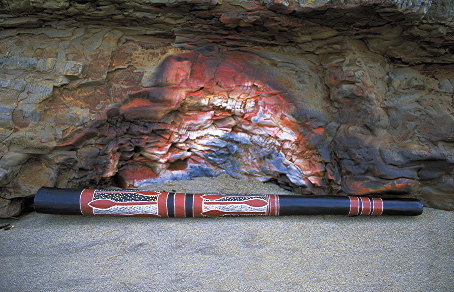Numerous medical organizations are recommending that playing the didgeridoo (also didjeridoo, didjeridu, didg, didj) can help people with obstructive sleep apnea, a common disorder that can have serious health implications, and also some cases of snoring that have a throat component. Playing the didgeridoo strengthens and tones the tissues of the throat, and can also provide good exercise for the respiratory system, as well as a meditation aid.
To address that issue, we recently founded the Worldwide Sleep Apnea-Didgeridoo Network, which launched in January, 2012. The network is designed to help connect sleep apnea patients, sleep clinics and care providers with local didgeridoo instructors.
Please note: We are NOT physicians and recommend that patients consult their professional healthcare providers and to follow their recommendations.
“One of the challenges in the treatment of sleep disorders is poor compliance. Thus new treatments not only need to be effective but also be ones that people are motivated enough to use. Didgeridoo playing seems to meet these requirements. Participants were highly motivated during the trial and practiced, on average, almost six days a week, which was even more than the protocol asked for. Regular playing of a didgeridoo reduces sleep apnea and snoring in people with moderate obstructive sleep apnea syndrome and also improves the sleep quality of partners. Severity of disease, expressed by the apnea-hypopnoea index, is also substantially reduced after four months of didgeridoo playing.” – US National Institutes of Health
The Mayo Clinic also recommends didgeridoo for sleep apnea in a recent book titled “The Mayo Clinic Book of Home Remedies” (2010).
Dr. Oz, of TV fame, recommends the didgeridoo for sleep apnea “to exercise the muscles in the back of the throat that cause snoring while you sleep. Those muscles get lax while you sleep so, by exercising them with with the didgeridoo, essentially a branch hollowed out by termites that turns into an instrument, you strengthen the muscles so they don’t collapse while you sleep.”
According to Rubin Naiman, PhD, an internationally recognized leader in integrative sleep and dream medicine and Clinical Assistant Professor of Medicine, University of Arizona: “Learning to play the didgeridoo is emerging as a surprisingly effective and practical strategy for managing snoring and sleep apnea symptoms. I encourage all my patients with these concerns to discuss this option with their doctors.”
If you are a didgeridoo player and wish to join the Sleep Apnea-Didgeridoo Network as a teacher, please click here.
Steve Sklar and Johnna Morrow offer both private didgeridoo lessons and workshops.
Individual lessons are $50/hr. Please contact us to arrange lessons and to inquire about group instruction.
Upcoming Beginning Didgeridoo workshop and other Skysong Productions workshops are listed here.

